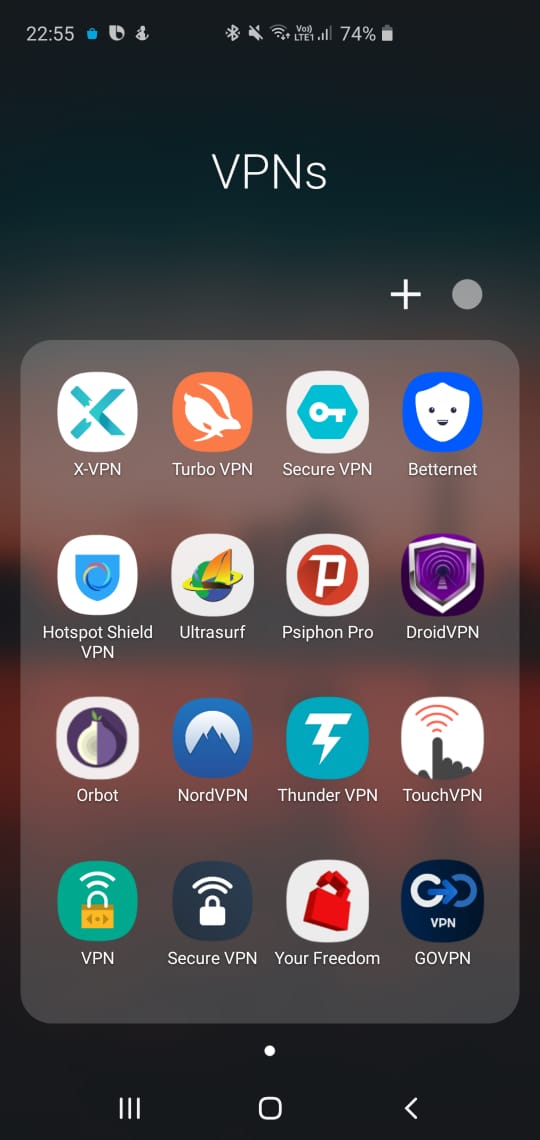X- VPN, Nord VPN, Ultrasurf, Turbo VPN, Thunder VPN, Hola VPN, and Touch VPN. These are not options suggested by a 'VPN service provider' but the Virtual Private Network application icons we found on the screen of Faisal Ahmed's* brand new mobile phone this week. Ahmed is in Delhi and gearing to go back to his home in Kashmir next week, where the government has just resumed 2G internet services after almost six months of communication blackout.
Advertisement
"It is easy now,” Ahmad tells VICE. “I downloaded the applications [in Delhi], uploaded them in apk format on Google Drive, which is a whitelisted website as per new government guidelines. My friends and cousins downloaded it and now access the internet despite the firewall by the government. I can do the same when I’m back," he gleefully grins.
Even though the government resumed the slow-speed 2G internet connectivity for 301 “whitelisted” websites last week, the list doesn't include social media platforms. But many people in the conflict-torn valley have resorted to using VPN apps to access 'blacklisted' sites.VPN allows a user to stay untracked from its location by use of the proxy server either by changing the IP address or by DNS tunneling. Usually used for data protection and to keep a check on snooping by companies, VPN has been widely used across the world to access restricted websites—especially Asian countries. In fact in India, VPN downloads saw a staggering rise of 405 percent after the government imposed a porn ban. In the times of government-sponsored internet ban, Kashmir, too, is navigating the 'blacklisted' digital space with the help of this tool.

This is not the first time Kashmir’s internet ban has had the people resort to VPN. In 2017, the Jammu & Kashmir’s home department banned social media applications such as Facebook, WhatsApp, and Twitter to curb street protests. VPN came to the rescue back then too. "Back in 2016, when militant commander Burhan Wani was killed and the government shut down the internet, people started using VPNs in order to bypass the censorship. This is quite normal. People would find a way to counter such silly bans in this age," Nayeem Khan, another VPN user from Srinagar who has been able to connect to his friends outside Kashmir on social media after 5 months, told VICE.
Advertisement
Last year, though, after August 5, when the government abrogated the special status of the erstwhile state of Jammu and Kashmir and clamped down on all communication channels, things were not so easy for Ahmed."We already know the modus operandi of the state. I was anticipating a communication blackout, so I had researched a few VPNs that would help if the government blocked the internet. With operators like Airtel and Jio dependent on 4G LTE for calling, you have to keep the data bandwidths open even if you block the internet,” says Ahmed, who is also a techie. “However, the government played smart and blocked the entire bandwidth, so that plan failed. But as soon as voice calls were resumed last week (even though the internet ban stayed), they had to reopen 4G towers and we could use VPN services again.”
“Of course, not many people could use it then because we could only share it one by one through Share it or Bluetooth,” he adds.It’s not some sort of a tech revolt, Ahmed reassures, but simply an attempt to have free access to the outer world. " Why would the government make us see only what it wants us to see? What is it afraid of? Why do I not have the freedom to browse whatever I wish to, on the internet? In this day and age, are you going to tell me not to use Facebook and WhatsApp, and then expect me to gracefully abide?"But in times like these, should people like Ahmed worry about being found? "Found out for what?" Ahmed responds. "Everyone is using it. The government officials themselves are uploading Facebook display pictures using VPN!"Last week, the moment 2G services got restored, many Kashmiri social media users, whilst connecting to their Facebook and Twitter through VPN, mocked the government. Posts like "VPN Zindabad" and "Viva La VPN" were uploaded by many Kashmiri netizens. The social media ban, however, continues to affect people not well-versed with technology. "Even though I come from a privileged background, my family hasn't been able to download a VPN and, hence, access to the internet has been severely limited,” Babrah Naikoo, a Kashmiri media scholar who studies in Delhi, tells VICE. “It is not just because of the blacklisting of websites but also because of the extremely poor speed.It’s been nearly six months that the communications blockade has continued to severely impact Kashmiris. Does the state even need one on social media right now? The spokesperson of the ruling Bharatiya Janata Party, GVL Narsimha Rao, told VICE that “only concerned agencies can clarify if there are indeed any such restrictions.” "Government agencies have been continuously relaxing all restrictions in Jammu and Kashmir in a progressive manner," he said.Follow VICE on Instagram.